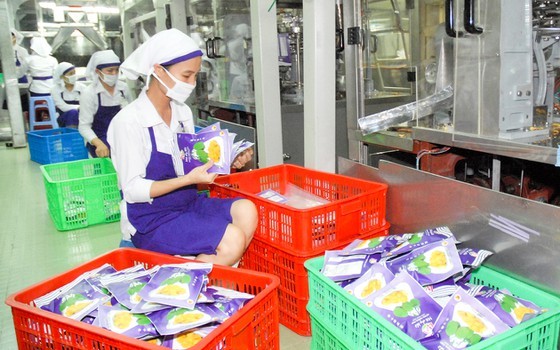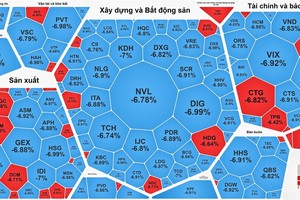
Many high-tech factories built
In the last days of last year, the agricultural sector received good news as the CPV Food Factory Complex of C.P Vietnam Livestock Joint Stock Company was put into operation in Binh Phuoc Province. Up to now, this is the largest chicken breeding and processing complex for export in Southeast Asia.
The project, which provides high-quality chicken products for export, has an initial investment capital of US$250 million, with an annual capacity of 100 million chickens. This factory expects to achieve annual revenue of $100 million in Phase 1 and $200 million in Phase 2.
CPV Food factory complex is invested in advanced technology in management, operation, and production to improve productivity and product quality, thereby strengthening competitiveness.
Earlier, after two years of construction, Van Ho fresh fruits and herbs processing factory in Son La Province of the TH Group was put into production at the end of September last year, with an investment of VND1.2 trillion.
The factory has a processing capacity of 300 tons of vegetables, fruits, and herbs. By 2025, this enterprise plans to increase its investment to VND3.5 trillion. It is a factory with a high rate of juice recovery of up to 80 percent. Waste of the factory is fruit residues that have been crushed. It will be taken out of the factory to the warehouse and dried as fertilizer, fuel, or food for the fisheries sector. To provide raw materials such as vegetables and fruits for the factory, the enterprise has cooperated with farmers to cultivate an area of about 35,000 hectares.
After a few months of putting the pepper freeze-drying processing factory into operation, the products of Phuc Sinh Company, which locates at 238 Vo Van Kiet Street in District 1 in Ho Chi Minh City, have accessed many fastidious markets, bringing high added-value.
Mr. Phan Minh Thong, Chairman of the Board of Directors of Phuc Sinh Company, shared that instead of selling raw peppercorn for only $3 per kilogram, freeze-dried peppercorn is seven times more expensive than the raw one. Therefore, although the factory's investment is more than VND50 billion, his company expects to recover investment capital in five years. Processed products have many advantages over raw ones. Raw goods contain many risks in preserving, transporting, and storing seasonally. Besides, if raw goods are not consumed in time, they will be damaged. Processed products have a long preservation time, suitable for Vietnam's agriculture.
Similarly, after having been put into operation for just over six months, the instant coffee factory of Intimex Group at 61 Nguyen Van Giai Street in District 1 in HCMC has been running at 70 percent of its capacity, producing 200 tons of finished products per month on average.
Mr. Do Ha Nam, Chairman of the Board of Directors of Intimex Group, said that the company could sell coffee products manufactured by advanced technology at high prices. Besides, with the production technology connected by modern information technology, importers can monitor quality remotely without going to Vietnam.
Legal basis for farming, growing raw materials areas
The policy to focus on the deep processing of agricultural and aquatic products to increase the value of Vietnamese agricultural products, helping Vietnam to become a large agricultural processing country for export has received broad consensus from ministries and associations to processing enterprises.
Mr. Dang Phuc Nguyen, General Secretary of the Vietnam Fruit and Vegetable Association, said that currently, Vietnamese agricultural products could only be sold in the areas near the ports when reaching the EU, the US, and Japanese markets. They cannot go deeper into the domestic market due to poor preservation. Therefore, the investment in the construction of agricultural product processing and preserving factories so that Vietnamese agricultural products can go further is a decisive requirement for the sustainable development of the agricultural sector of Vietnam.
Mr. Nguyen Quoc Toan, Director of the Agro Processing and Market Development Authority under the Ministry of Agriculture and Rural Development, said that in the coming time, processing would become a key content in agricultural restructuring. Vietnamese agriculture products are exported to many markets with very long transport times, so it requires good storage technology and modern and efficient processing technology following the food safety criteria of markets around the world.
According to many economic experts, this is the right step for the agricultural sector. To do this, a system of modern processing facilities must be established with the connection to the raw material growing areas. The cultivation of aquatic products, seafood, fruits, and vegetables for processing must ensure safety standards.
Therefore, the State needs to have specific support policies for the foodstuff processing industry and build a legal basis to form large-scale raw material farming and growing areas, ensuring the production of qualified products. In the short term, Vietnamese small and medium-sized enterprises can cooperate with FDI enterprises or import partners to build processing factories to gradually accumulate capital and knowledge.
























